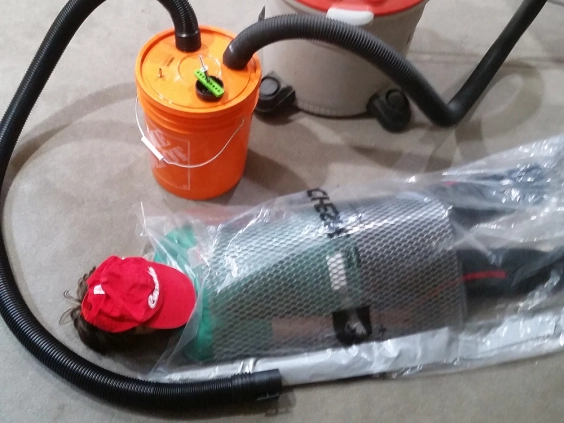-
Posts
6223 -
Joined
-
Last visited
-
Days Won
35
Content Type
Profiles
Forums
Events
Everything posted by J.C.MacSwell
-

Corona virus general questions mega thread
J.C.MacSwell replied to FishandChips's topic in Microbiology and Immunology
You could be right. Too much spreadability could also be disadvantageous to the virus's long term "health", as it should lead more quickly to herd immunity (for whatever herd might host it) -

Corona virus general questions mega thread
J.C.MacSwell replied to FishandChips's topic in Microbiology and Immunology
That's a good argument. I'm just asking if it has been verified to any degree. When it only kills a small percentage of the hosts, and those killed off still last a substantial time the others would be contagious, I would not expect it to be a major driver...as in statistically difficult to correlate. -

Corona virus general questions mega thread
J.C.MacSwell replied to FishandChips's topic in Microbiology and Immunology
Is this then an example of a well known trend? -

Comparing Corona Virus Success Stories with Abysmal Failures
J.C.MacSwell replied to Alex_Krycek's topic in Politics
You do know it's past noon... -

Coffee filters as face masks?
J.C.MacSwell replied to Enthalpy's topic in Microbiology and Immunology
Mask shortage certainly is. Politically "correct" dishonesty may be as well, but that is debatable. -

Coffee filters as face masks?
J.C.MacSwell replied to Enthalpy's topic in Microbiology and Immunology
I'm not sure what your point is. It's a first, second, and third World problem. Per CNN: https://www.cnn.com/2020/03/30/world/coronavirus-who-masks-recommendation-trnd/index.html "There is no specific evidence to suggest that the wearing of masks by the mass population has any potential benefit. In fact, there's some evidence to suggest the opposite in the misuse of wearing a mask properly or fitting it properly," Dr. Mike Ryan, executive director of the WHO health emergencies program, said at a media briefing in Geneva, Switzerland, on Monday. "There also is the issue that we have a massive global shortage," Ryan said about masks and other medical supplies. "Right now the people most at risk from this virus are frontline health workers who are exposed to the virus every second of every day. The thought of them not having masks is horrific." -

Coffee filters as face masks?
J.C.MacSwell replied to Enthalpy's topic in Microbiology and Immunology
All discussed in the thread (socks is new) And the "better than nothing" has been debated. Some good points in that regard but not, IMO, enough to claim no general benefit. -

Coffee filters as face masks?
J.C.MacSwell replied to Enthalpy's topic in Microbiology and Immunology
Yes. It's been discussed in this thread. Also: https://www.healthline.com/health/cold-flu/mask#recommendations In the case of the novel coronavirus and COVID-19, the CDCTrusted Source notes that: “CDC does not recommend that people who are well wear a facemask to protect themselves from respiratory illnesses, including COVID-19. You should only wear a mask if a healthcare professional recommends it. A facemask should be used by people who have COVID-19 and are showing symptoms.” -

Coffee filters as face masks?
J.C.MacSwell replied to Enthalpy's topic in Microbiology and Immunology
It's just a matter of time IMO (or more precisely a matter of masks becoming available) But despite lack of scientific data either way, it will eventually be admitted that masks can protect the user...even if not a "trained professional" that badly needs one. "Other nations recommend wearing masks to avoid coronavirus, but the Trump administration has not seen a benefit." https://www.politico.com/news/2020/03/30/coronavirus-masks-trump-administration-156327 -
At least Captainzen understands the gravitational of the situation... ...and I'll see myself out...
-
Should it not be (32, 1; 2, 31)...?
-
The problem with our "deep" freezer is that we only use the top few inches of it...peaking below that is a little scary...full of stuff that if thrown out would need expensive replacements that would not be eaten either...
-
Sorry to hear about your Dad. I hope any relatives in Italy are safe. I don't know much about beta-blocker effects on mucus but it does seem that mucus is a double edge sword, protecting compromised areas but sometimes also creating conditions for pathogens to multiply and restricting the O2 and CO2 transfers as you said. Removal seems to be beneficial generally. Isn't that why we cough? But we keep producing more. Ideally ventilators assist in the process of mucus removal (to whatever degree is helpful) as well as increasing airflow to compensate for the reduced lung capacity.
-
What do you guys have? Perrier faucets? Regular treated water for households is nowhere near that cost.
-
We weren't going to tell you yet... but since you figured it out...just don't tell the others (there's still a small percentage in every country that aren't in on it)
-
I can see the optimal designs (ones that get feedback from the patient's breathing and require precise controls) being somewhat complicated to Engineer, but I would assume their use would (or should) be fairly intuitive to any medical staff with experience using current designs. I would also assume they would use standard disposable breathing tubes etc. Did Dyson make his more complicated or substantially different to use?
-
A positive system powered by a windshield wiper motor and built from plywood and common items: It could also be used to assist breathing in a negative system (as above in the Canadian Engineers concept) A windshield wiper motor is of course controllable to some extent using common parts. The key is getting the timing right to support breathing.
-
That of course assuming the simplest system that does not intentionally vary the pressure to the breathing cadence, to provide further assistance as necessary in some cases.
-
Can you "expand" on that? (pardon the pun) I thought compression of the lungs was less of a problem than expansion...as indicated by my belief a pressure very slightly above ambient would be net beneficial. When I relax I let air out. Here's an idea that I think is pretty cool by a couple Canadian Engineering professors using both common household items and vacuum pressure to the chest (so the face doesn't even need a mask) https://calgaryherald.com/news/local-news/alberta-professors-build-ventilator-prototype-using-shop-vac-home-depot-bucket/ Here on the same with video: https://www.660citynews.com/2020/03/25/alberta-team-creates-breathing-machine-prototype-as-ventilator-backup/ Another advantage of this type of system, which would be potentially critical for anything below what would be typical hospital grade, is that in case of the system failing there at least is nothing to obstruct the breathing that the patient can muster on their own. Any vacuum would only need to work hard enough to compensate for any leakage, so it could be extremely efficient for both energy used by the system as well as the effort from the patient, again assuming that lung expansion takes the majority of the effort to breath. For Third World or remote applications, a decent seal could allow intermittent maintenance by a hand pump.
-
James Dyson (vacuum fame) designed a ventilator in 10 days and plans on making 15,000 of them: https://www.cnn.com/2020/03/26/tech/dyson-ventilators-coronavirus/index.html MIT has a designed an open-source ventilator: https://www.technologyreview.com/s/615374/an-mit-team-hopes-to-publish-open-source-designs-for-a-low-cost-ventilator/ We have a couple supplied air systems at work for confined spaces. The simplest one is an ambient air system that supplies a controlled airflow to one or two masks (full face). Because the air is not compressed no real filtration system is required, just a simple dust filter (Our compressed air supply requires filtration to remove any oil that might blow by the piston) These types of systems are not expensive, though their "controlled airflow" is just a setting, it doesn't respond to the cadence of breathing and uses valves to allow exhalation or excess airflow exhaust. On the right setting, would this not facilitate breathing?
-
My rudimentary understanding was that they supported breathing by supplying air at a slight positive pressure. By responding to the natural breathing this would be at slightly greater for intake which normally takes more effort, and slightly less (but still positive) during air expulsion. They can also be used supplemented by higher oxygen, anesthetics, or other treatments. They do treat pneumonia, which can take place with the Covid 19 virus, by compensating in that manner. https://en.wikipedia.org/wiki/Ventilator https://www.theguardian.com/world/2020/mar/26/what-happens-to-peoples-lungs-when-they-get-coronavirus
-

Corona virus general questions mega thread
J.C.MacSwell replied to FishandChips's topic in Microbiology and Immunology
If I can plug a thread I've opened up...availability of ventilators (or alternatives?), or lack there, of will have (already has had) a significant effect. -
One of the significant factors in avoiding deaths due to Covid 19 is the lack of ventilators available as our health systems become overwhelmed. Here is a short read that outlines the problem. https://www.nbcnews.com/health/health-news/what-ventilator-critical-resource-currently-short-supply-n1168641 I put this in Engineering but let's not limit it to that. This certainly needs scrutiny from a biology perspective, and probably many others I can't think of. Any suggestions as to ways to mitigate this problem? Also why they might not work...that could trigger a thought that could work. I can certainly suggest ways to increase oxygen availability for interaction in the lungs but have limited knowledge of the way the body would react to it. Even semi-effective suggestions could lead to freeing up ventilators from patients that might marginally need them for ones in more dire straits. Oxygen tents? How about rooms with slightly elevated oxygen? How about turbulating the air that gets intaken? Warming the air taken in? Positive airflow from a tube to the bottom area of each lung? Move people to sea level? How about slightly hyperbaric? How? (ever been to a hockey rink/soccer field or other dome supported by air pressure?) Other than reducing the spread of the virus to the more vulnerable...how can this problem be reduced? In minimal time...should we watch Opollo 13 again? If you were on your own in your house, but isolated from everyone, and knew you would need respiratory help from a ventilator within 2 weeks what would you do? How about the same time frame but more resources?
-

Corona virus general questions mega thread
J.C.MacSwell replied to FishandChips's topic in Microbiology and Immunology
Maybe Trump's right...I just missed the news about car fatalities going up exponentially... ...but that's just me...when more and more buses start driving off cliffs I'll probably wonder why I'm the only passenger...and why my ticket was such a bargain. -

Comparing Corona Virus Success Stories with Abysmal Failures
J.C.MacSwell replied to Alex_Krycek's topic in Politics
But the James Bond movies would suffer...


